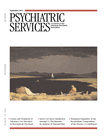A New Blood-Based Diagnostic Aid for Schizophrenia
Such a test has recently been developed, validated, and marketed in the United States. This test, VeriPsych, uses a multiplex immunoassay technology that profiles a proprietary disease signature comprising 51 analytes. The test has been found to be 83% sensitive and specific in distinguishing persons with schizophrenia from those without the disorder; the study in which the test's validity was established included more than 500 patients in the development phase and more than 800 patients in the validation phase (5). However, little has been subsequently published about this test, and its clinical utility remains unclear.
Our treatment team administered the test to a 30-year-old woman with a five-year history of schizophrenia who did not accept the fact that she had schizophrenia and who had problems remaining adherent to antipsychotic medications. The test yielded a positive result for the diagnosis of schizophrenia (score of −9199), with a conditional probability score that indicated a 95% chance of having the illness. After being informed of these results, our patient began to accept that her symptoms could be attributed to schizophrenia. For the first time, she expressed interest in learning about schizophrenia, acknowledged a personal connection to her family history of the disorder, and accepted her need of antipsychotic medications. Her therapeutic alliance with her psychiatrist and treatment team has improved, she has enrolled in a college-level class, and her attitude toward antipsychotic treatment remains positive. Her psychiatrist notes that this remarkable change was the result of her confidence in the blood test results—for the first time she had objective data about her illness.
Improving insight and illness acceptance among patients with schizophrenia has proven to be no small task. Psychoeducation, meta-cognitive training, cognitive therapy, and family intervention aimed at developing an understanding and acceptance of schizophrenia have shown only some success (1). Our interest in the test was not to confirm a clinical diagnosis of schizophrenia but to help a patient with schizophrenia accept her illness. We feel that if this test or future serum tests are more widely utilized, then their use as an aid in helping people who have no illness insight or who lack acceptance of their illness may be an important application. We hope that our letter will bring attention to this new test and encourage further research to replicate and validate our results. We also need to develop a better understanding of the clinical and research uses of this blood-based diagnostic aid and of its potential role and place in the treatment of patients with schizophrenia.
1 : Lack of awareness of illness in schizophrenia: conceptualizations, correlates and treatment approaches. Expert Review of Neurotherapeutics 9:1035–1043, 2009 Crossref, Medline, Google Scholar
2 : Lack of insight in schizophrenia: impact on treatment adherence. CNS Drugs 21:129–141, 2007 Crossref, Medline, Google Scholar
3 : Identification of a biological signature for schizophrenia in serum. Molecular Psychiatry epub ahead of print PMID
4 : Profiling for novel protemonics biomarkers in neurodevelopmental disorders. Expert Review of Proteomics 8:127–136, 2011 Crossref, Medline, Google Scholar
5 : Validation of a blood-based laboratory test to aid in the confirmation of a diagnosis of schizophrenia. Biomarker Insights 5:39–47, 2010 Crossref, Medline, Google Scholar



